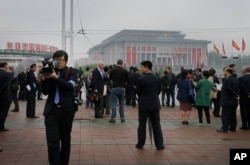North Korea has opened one of its biggest political meetings in 36 years, as the 7th Workers' Party Congress began meeting Friday in Pyongyang.
However, foreign journalists who traveled to Pyongyang for the event were not immediately allowed inside.
The United States is in close consultation with its Asian allies to monitor the situation on the Korean Peninsula during the high-level meeting of party representatives, which is expected to result in a reshuffling of some top officials.
North Korea is scheduled to have its 7th Workers' Party Congress on Friday. It's a high-level meeting of party representatives and is expected to result in a reshuffling of some top officials.
Washington also is anticipating the isolated regime may take this occasion to launch a missile or conduct a nuclear test.
"We will continue to look at ways we can apply and increase pressures on them, at the same time as we ensure that the security of the peninsula is kept ironclad," said State Department spokesman Mark Toner on Thursday.
Pyongyang has carried out a few ballistic missile tests in recent months, as well as its fourth nuclear test in January. Toner said the United States would welcome any signs of de-escalation by the North Korean regime.
The U.S. Director of National Intelligence, James Clapper, arrived in Seoul earlier this week. He met with South Korea's Defense Minister, Han Min-koo, and discussed security issues, according to South Korea's Yonhap News Agency.
The possibility of another nuclear test from North Korea was also discussed.
"Kim Jong Un will need to deliver a report that summarizes the Korean Workers' Party's accomplishments since the last congress in 1980 and present new policy directions. As for the new policy directions, I expect him to highlight the Byungjin line," James Person of the Woodrow Wilson International Center for Scholars in Washington told VOA on Thursday.
The "Byungjin line" is the policy of the simultaneous development of the nuclear program and the consumer goods industries.
But Person does not expect any new major policy directions in economic development because North Korea's Workers' Party Congress meetings are usually "scripted affairs" and typically do not offer major policy announcements.
While anticipating more provocations from North Korea, including a fifth nuclear test, senior U.S. officials have warned of "additional steps" to punish Pyongyang and to defend Washington and its allies.
"Despite all the saber-rattling, I don't think the North [Korea] is under any illusions about the consequences of attack," Assistant Secretary of the State Daniel Russel said Tuesday at an event hosted by the Center for Strategic and International Studies.
Washington has begun formal discussion with Seoul on potentially deploying a top missile defense system in South Korea, the so-called Terminal High Altitude Area Defense, or THAAD.






